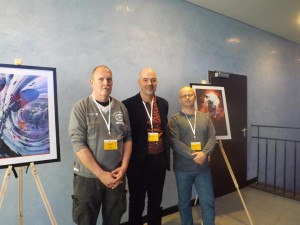The longest exposure I have had to a Muslim society is the couple of occasions I have stayed in the Moroccan seaside town of Oued Laou in the company of my friend Jonathan, who speaks Moroccan Arabic. Small things I’ve noticed and liked are that the standard greeting to a stranger is “Peace be with you”, and the way that any discussion of future events is routinely followed by the phrase “insha’Allah” (God willing), but, for an outsider, the most obvious manifestation of the Muslim religion occurs at intervals through every day, when the loudspeakers at the top of the town’s main mosque crackle into life and you hear the beautiful call to prayer, echoed by other mosques across the Laou valley and up on the surrounding hillsides. At these times, if you go into the little market, many of the stalls are simply unattended. Their owners can be seen through the open door of the mosque, shoeless, praying. I find this moving, admirable even: the idea of a community which, at regular intervals through the day, sets aside its own individual concerns and preoccupations, and submits itself to the mystery at the core of the universe itself. I can see how, by comparison, modern secular western society might seem shallow and narcissistic. And I can see why someone taking part in these rituals that are shared by Muslims across the world, might experience Islam as a religion of peace.
A not-particularly religious Muslim friend spoke in similar terms about the month of Ramadan. There was something rather wonderful, she said, about the idea that an entire community was moving together through this season of abstinence and self-denial, reminding themselves that there was more to life than simply the pleasure of the senses. As a child, when my (also not particularly religious) parents sent me to Sunday School, I acquired a somewhat similar feeling about the traditional Christian calendar. Though the religion itself didn’t rub off on me (or on my parents either, as it turned out!) I still like the idea of an entire community (and in days gone by, an entire society) moving together through a story, repeating it over and over: Advent, Christmas, Lent, Easter…
Religions are sometimes characterised as a set of ‘beliefs’, of propositions, of statements about what is and isn’t true, and while most of them do include this element, it is quite a narrow way of looking at them, for there is a great deal more to them than that. They are also customs, practices, shared ways of doing things, collective acts of imagination. Whether the stories we enacted in Sunday School were literally true or not, they certainly brought me closer to some of the mysteries of life, and part of that was to do with the cycle itself, the repetition, which somehow made them much deeper than a single telling would have done.
I’m sure the same is true of the customs of practicing Muslims, and for that reason I don’t find it hard to see why these practices and rituals seem profoundly precious to them, and why they should be distressed when others mock. Life is hard, and it can seem empty and futile. Each of us tries to find ways of imbuing it with some sense of purpose, or beauty, or meaning, but all of those ways are fragile. We should be as respectful and gentle as we can with one another’s attempts. Mocking other people’s religious practices, just for the sake of it, is simply rude and inconsiderate in much the same way as it would be rude and inconsiderate to barge into a concert that other people were enjoying and shouting out abuse, just because the music wasn’t to our own taste.
There is a “but” though.
* * *
Islam may be more than just a set of “beliefs”, but nevertheless (like most religions, and more than many) it certainly includes beliefs. To be specific, a core belief is the idea that the words of the Quran are the infallible word of God. And this is where things get complicated, because these words sanction behaviour that, in modern terms, would be heinous criminal offences in most parts of the world . To give one example, the Quran very clearly states in several places that a man is entitled to have slave girls and to have sex with them.
Here are Surahs 23: 1-6*:
(1) The believers must /(Eventually) win through –
(2) Those who humble themselves / In their prayers;
(3) Who avoid vain talk;
(4) Who are active in deeds/ Of charity;
(5) Who abstain from sex,
(6) Except with those joined/ To them in the marriage bond,/ Or (the captives) whom / Their right hands possess –/ For (in their case) they are / Free from blame.
See also, among others, Surah 4:24, which prohibits sex with married woman unless they are your captives (in which case it’s fine), or Surah 33: 50, which begins “Oh Prophet! We have / Made lawful to thee / Thy wives to whom thou / Hast paid their dowers; / And those whom thy / Right hand possess out of /The prisoners of war whom / Allah has assigned to thee…” Here, note, it is Mohamed himself who is being told by God that he can have sex with women he’s captured in war.
Of course the Quran is of its time, written in the early decades of the seventh century, when England was still a collection of petty Anglo-Saxon kingdoms that wouldn’t come together as a single country for another 300 years. I am sure that the Angles and Saxons who settled Britain, and the Romans who preceded them, and the Vikings who were to follow, would all have had a similar attitude towards female captives, and certainly the Old Testament, which Jews and Christians alike traditionally view as the word of God, contains similar notions. I’m even prepared to be persuaded that Islam was in many respects ahead of its time, back in the seventh century. (Perhaps it’s Islam’s misfortune that its founder felt the need to lay down very specific instructions which aren’t terribly amenable to reinterpretion). But the fact remains is that what is being sanctioned in these verses is, in modern terms, the crime of rape: the feelings and wishes of the women and girls simply do not come into the equation at all. And, right now in the twenty-first century, Islamic State in the Middle East and Boko Haram in Nigeria are using the authority of the Quran to justify capturing girls, making them into sex slaves, and even (in the case of IS) giving out a nicely printed leaflet confirming that it is fine for their followers to have sex with girls (including prepubescent girls) that they capture.
I know that many Muslims would say that such behaviour is not consistent with their own understanding of the religion, and I really do believe them: religion in practice really is a much more complex, idiosyncratic and many-layered thing than its doctrines would suggest on cold examination. But until a modern Islam emerges that is able to draw a clear line between itself and the idea that the verses of the Quran really are literally the word of God, Muslims can’t expect their religion or their prophet to be exempt from the criticism and mockery of those who find many of those verses to be brutal, abhorrent and medieval**.
Which I guess was Charlie Hebdo’s point when they printed their fateful Nov 2011 cover on which a cartoon Mohamed tells readers, “A hundred lashes if you don’t die laughing.”
*I am using the translation edited by Abdullah Yusuf Ali, and distributed free by the Albirr Foundation UK (10th edition, 1999).
** I’m using the issue of women and slavery as an example, but I could have used others. IS’s use of crucifixion as a punishment for their opponents, for instance, is also specifically sanctioned by the Quran, which states that that “execution, or crucifixion, / Or the cutting off of hands / And feet from opposite sides, / Or exile…” are the appropriate punishment for “those who wage war against Allah and his messengers” (5:33).


